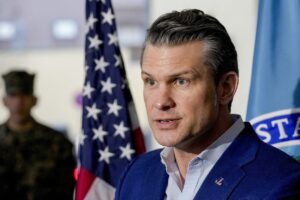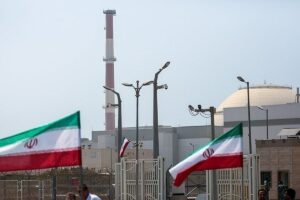The United States and Iran are denying reports that the two sides are engaged in secret negotiations following a prisoner exchange deal earlier this month that included the unlocking of billions of dollars of frozen Iranian funds.
There are no direct or indirect talks scheduled, including any involving Brett McGurk, White House coordinator for the Middle East and North Africa, a U.S. official told VOA on Wednesday. The official spoke on condition of anonymity to discuss national security matters.
The Iranian Foreign Ministry on Tuesday dismissed a report by a U.K.-based media outlet that authorities in Tehran had granted its negotiators permission to enter direct talks with Washington to ease sanctions in return for Iran slowing down its uranium enrichment program.
“This type of news sensationalism and media games, which is often used to create a political atmosphere, lacks credibility,” the ministry said, as reported by Iranian state media.
However, Washington appears to be leaving open its door to negotiations.
“We have always said that we are open to diplomacy with Iran. I don’t want to get into what any such talks might or might not look like, but diplomacy, we believe, is the best path to preventing Iran from obtaining a nuclear weapon,” State Department spokesperson Matthew Miller said in response to VOA’s question on whether the U.S. would be willing to engage in direct talks with Iran.
There are a number of de-escalatory steps the U.S. wants Iran to take before talks, Miller added, including cooperation with the International Atomic Energy Agency.
Meanwhile, Senator Ted Cruz, a Republican member of the Senate Foreign Relations Committee, is demanding disciplinary action on current administration officials, including those linked to Robert Malley, President Joe Biden’s former special envoy to Iran.
“The Biden administration should immediately cease its secret diplomacy with Iran and its dismantling of sanctions, and any officials linked to these emails should immediately have their security clearances pulled until these allegations are fully resolved and accountability is imposed,” Cruz said in a statement Tuesday.
Cruz released his statement in reference to media reports that the U.S. officials developed ties with a network of Iranian academics and researchers aiming to influence U.S. policy on Iran a decade ago.
Cruz’s office did not respond to VOA’s request for evidence to back his claims of the administration’s “secret diplomacy.”
Malley has been on leave since June while his security clearance is under review amid an investigation into his handling of classified material.
Diplomatic breakthrough
In a major diplomatic breakthrough earlier this month, U.S. and Iranian officials concluded a deal in which five Americans who had been imprisoned in Iran were freed in exchange for five Iranians accused of violating U.S. sanctions, and the unfreezing of $6 billion in Iranian oil revenue.
U.S. officials insist that negotiations on the swap were unrelated to efforts to revive the Joint Comprehensive Plan of Action (JCPOA), the 2015 deal to curb Iran’s nuclear program in exchange for sanctions relief.
Then-President Donald Trump withdrew the U.S. from the deal in 2018. A year later, Iran began ignoring limitations on its nuclear program while still maintaining that its nuclear program is for civilian, not military, purposes.
Many had hoped the prisoner exchange would pave the way to discussions on more substantive issues, and some observers believe that they have.
There are ongoing talks to de-escalate tensions, said Sina Azodi, a researcher of U.S.-Iran ties and a lecturer at the Elliott School of International Affairs at The George Washington University, quoting sources.
For the United States, Azodi told VOA, a key goal in these talks is to scale down Iran’s pace of uranium enrichment. Tehran announced in 2021 it was enriching uranium to 60%, which would shorten its so-called breakout time to build a nuclear weapon, which requires uranium that is enriched above 90%.
Low-level talks
Such talks could be happening indirectly at a lower-stakes level, not involving McGurk and his Iranian counterpart, Ali Bagheri-Kani, said Alex Vatanka, director of the Iran Program at the Middle East Institute.
“The fact that the authorities from Qatar and Oman are saying this and are talking about putting forward suggestions to push forward with nuclear talks, to me suggests that’s real,” Vatanka told VOA, referring to the two countries who acted as interlocutors in the prisoner swap deal.
Earlier this month, Reuters reported that Qatar held separate bilateral meetings with Washington and Tehran that touched on Iran’s nuclear program and U.S. concerns about Iranian drone transfers to Russia that are used to attack Ukraine.
Those concerns and others, including preventing Iranian attacks on Americans in the Middle East, have been transmitted, said Barbara Slavin, a distinguished fellow at the Stimson Center. But apart from conversations earlier this year between Malley and Saeed Iravani, Iran’s ambassador to the United Nations, communications have been indirect.
“I don’t see any interest on the part of Brett McGurk to meet with the Iranians right now,” Slavin told VOA.
Geopolitically, conditions are not conducive to a JCPOA revival. The deal was negotiated with the P5+1 countries of the U.N. Security Council — China, France, Russia, the United Kingdom and the United States.
On Wednesday, the Biden administration announced sanctions on a network of entities and individuals it said was facilitating shipments and financial transactions in support of Tehran’s procurement of a critical component used in Iran’s Shahed-136 drones the U.S. says are being used by Russia in Ukraine.









